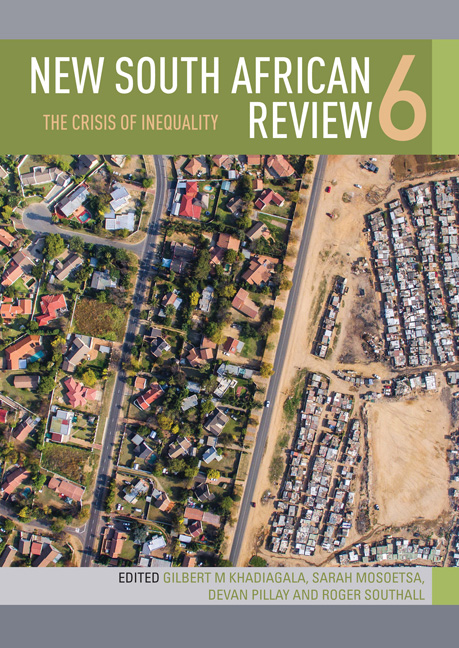Book contents
- Frontmatter
- Contents
- List of tables and figures
- INTRODUCTION: The global crisis of inequality and its South African manifestations
- PART 1 INEQUALITY AND CLASS: POLARITIES AND POLICIES
- PART 2 THE POLITICS OF INEQUALITY
- PART 3 SOCIAL DIMENSIONS OF INEQUALITY
- CHAPTER 8 Analysis must rise: A political economy of falling fees
- CHAPTER 9 Education, the state and class inequality: The case for free higher education in South Africa
- CHAPTER 10 Still waiting: The South African government's pending promise of equality for people with disabilities
- CHAPTER 11 Big fish in small ponds: Changing stratification and inequalities in small towns in the Karoo region, South Africa
- PART 4 LAND AND ENVIRONMENT
- Contributors
- Index
CHAPTER 10 - Still waiting: The South African government's pending promise of equality for people with disabilities
from PART 3 - SOCIAL DIMENSIONS OF INEQUALITY
Published online by Cambridge University Press: 23 March 2018
- Frontmatter
- Contents
- List of tables and figures
- INTRODUCTION: The global crisis of inequality and its South African manifestations
- PART 1 INEQUALITY AND CLASS: POLARITIES AND POLICIES
- PART 2 THE POLITICS OF INEQUALITY
- PART 3 SOCIAL DIMENSIONS OF INEQUALITY
- CHAPTER 8 Analysis must rise: A political economy of falling fees
- CHAPTER 9 Education, the state and class inequality: The case for free higher education in South Africa
- CHAPTER 10 Still waiting: The South African government's pending promise of equality for people with disabilities
- CHAPTER 11 Big fish in small ponds: Changing stratification and inequalities in small towns in the Karoo region, South Africa
- PART 4 LAND AND ENVIRONMENT
- Contributors
- Index
Summary
From a constructivist perspective the causes and manifestations of inequality are multidimensional. Different populations affected by systemic inequality are disadvantaged through a convergence of socio-economic, cultural and political factors that are also historically and contextually bound. Moreover, inequality is not experienced the same way either horizontally between different groups or vertically among people within the same group. Constructivism allows for a more nuanced understanding of the causes and consequences of inequality for particular groups within society.
Relatively little attention has been paid by development studies to issues concerning people with disabilities, in South Africa and elsewhere. In the transitional and immediately post-apartheid years of the 1990s, some progress was made by government in addressing the development needs of people with disabilities – indeed, South Africa was regarded internationally as a leader in addressing the rights of the disabled. However, this focus has waned. We will argue in this chapter that the accommodation of people with disabilities in the South African political economy was critically compromised by the country's post-apartheid embrace of several key policy choices. Most fundamentally, South Africa's initial vision of a society built on social democratic principles has been eroded by the awkward marriage of neoliberal economics to these ideals – a step initially marked by the abrupt abandonment of the Reconstruction and Development Programme (RDP) for the Growth, Employment and Redistribution (Gear) strategy in 1996 (see Naidoo 2010; Marais 2011). In this context, the adoption of a development framework based on human rights and social justice was unable to be effectively implemented, and the government's commitments to people with disabilities concomitantly waned. The steady spread of corruption and maladministration has only served to make the situation worse.
DISABILITY AND INEQUALITY IN SOUTH AFRICA
Despite variations and nuances in the manifestations of inequality, it can be firmly observed in South Africa – as elsewhere – that disabled people are typically the most disadvantaged within the various social categories of difference and inequity (Yeo and Moore 2003; Graham et al. 2013; Loeb et al. 2008; Leibbrandt et al. 2010). Despite wide-ranging constitutional and legislative provisions aiming to guarantee the rights of people with disabilities in South Africa, the disabled remain marginalised socially and economically.
- Type
- Chapter
- Information
- New South African Review 6The Crisis of Inequality, pp. 183 - 199Publisher: Wits University PressPrint publication year: 2018



